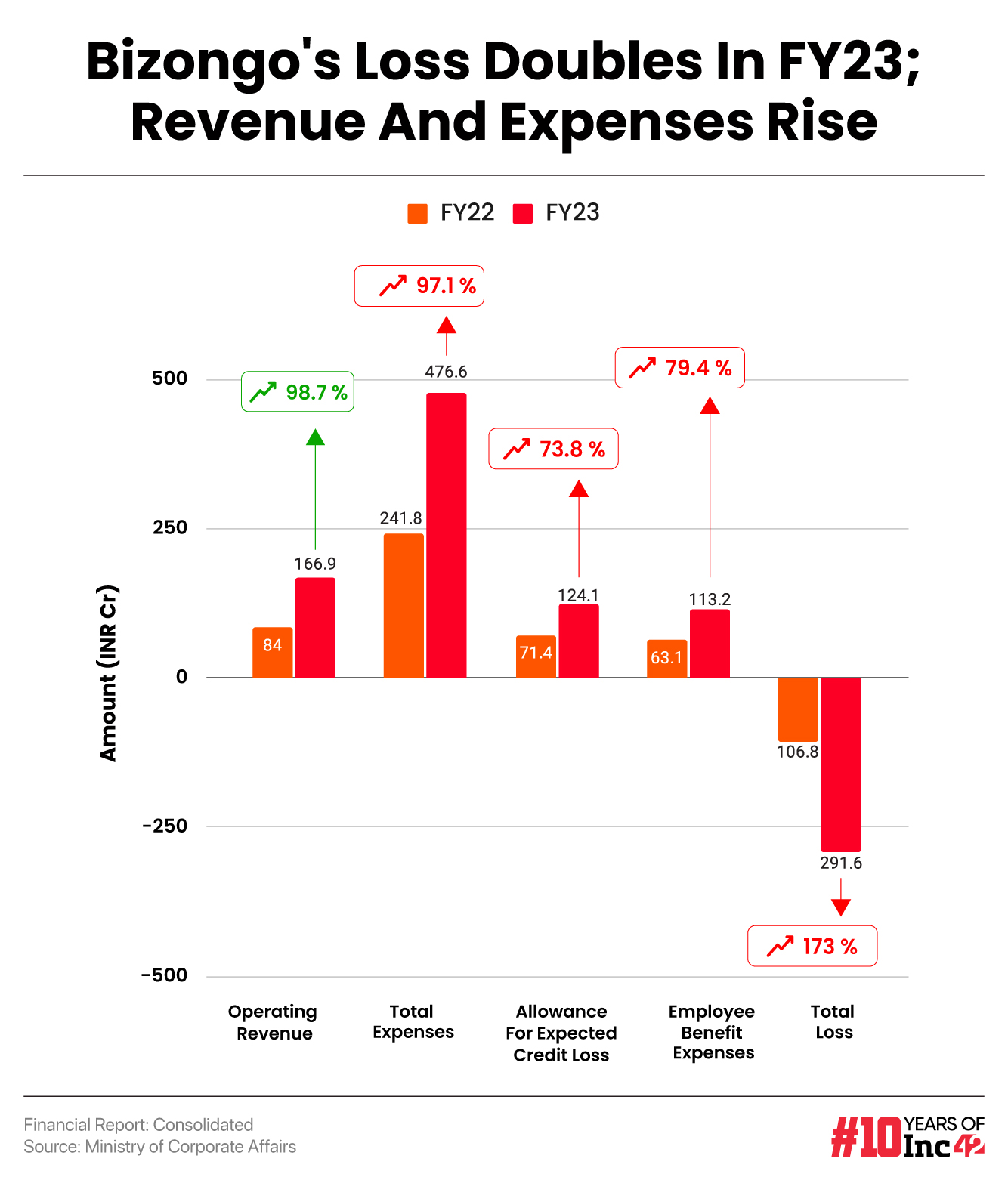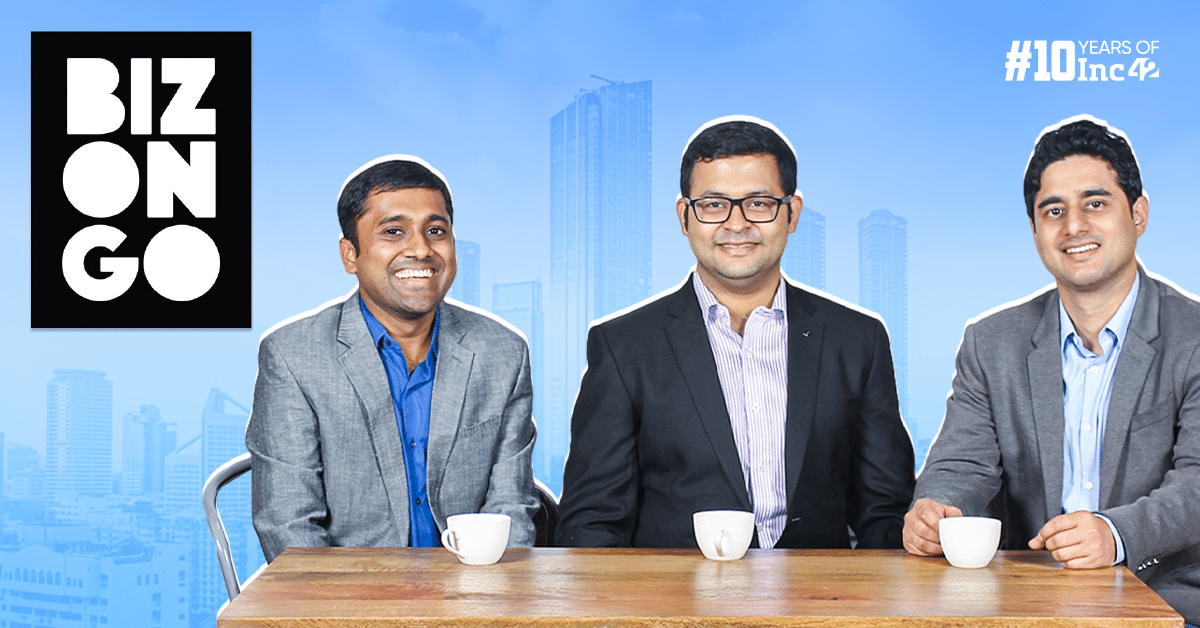SUMMARY
The startup’s loss more than doubled to INR 291.6 Cr despite almost a 99% YoY jump in operating revenue to INR 166.9 Cr in FY23
Bizongo earned a majority of its revenue from service fees, which stood at INR 161.2 Cr in FY23
Total expenses jumped over 97% to INR 476.6 Cr in FY23 from INR 241.8 Cr in the previous fiscal year
B2B vendor management startup Bizongo’s consolidated net loss more than doubled to INR 291.6 Cr in the financial year 2022-23 (FY23) from INR 106.8 Cr in the previous fiscal year, hurt by a staggering jump in certain expense heads.
The startup’s bottom line was hurt despite almost a 99% jump in operating revenue to INR 166.9 Cr during the year under review from INR 84 Cr in FY22.
Founded in 2015 by IIT graduates Aniket Deb, Sachin Agrawal, and Ankit Tomar, Bizongo started as a packaging solutions provider to various sectors, including fashion and lifestyle, textiles, and consumer staples. Later, the startup expanded its offerings by introducing software-based vendor management services, supply-chain automation, and financing solutions.
The startup earned a majority of its revenue from service fees, which stood at INR 161.2 Cr in FY23.
It had two other sources of operating revenue – design income (the startup enters into agreements with customers to create design/logo for their packaging materials) and platform fees, which stood at INR 2.7 Cr and INR 3 Cr, respectively.
Besides, Bizongo also earned a small part of its revenue – INR 55 Lakh – from sales outside India in the reported fiscal.
Including interest income and other non-operating income, total revenue stood at INR 185 Cr in FY23 as against INR 135 Cr in the prior year.
It is pertinent to note that Bizongo raised $25 Mn in funding from Liquidity Group in FY23 for its business expansion in Southeast Asia and to grow its customer base for supply chain business.
In line with the business growth, Bizongo’s total expenses also increased.
Where Did Bizongo Spend?
The startup’s total expenses jumped over 97% to INR 476.6 Cr in FY23 from INR 241.8 Cr in the previous year, with finance costs comprising the largest portion of it.

Finance Cost: Bizongo’s spending in this bucket jumped almost 300% year-on-year (YoY) to INR 151.9 Cr in FY23.
Employee Cost: The startup spent INR 113.2 Cr on employee benefits during the year under review, a jump of 79.4% from INR 63.1 Cr a year ago.
In that, it spent INR 78.9 Cr on salaries and wages, a 59% rise YoY.
Allowance For Expected Credit Loss: Bizongo estimated its bad debt in FY23, which the startup is unlikely to recover, at INR 124.1 Cr, a 73.8 % jump YoY.
Changes In Inventories: The startup spent INR 12.3 Cr for changes in inventories of finished goods, work-in-progress, and stock-in-trade in FY23, a slight decline from INR 12.6 Cr spent here a year ago.
On a unit economic basis, Bizongo spent INR 2.9 to earn every rupee from operations in FY23.
In November last year, Bizongo raised about $50 Mn in a Series E funding round led by Zurich-based private equity firm Schroder Adveq, with participation from International Finance Corp, Chiratae Ventures, B Capital, and British International Investment. The startup was aiming to achieve profit before tax by the end of FY24.
With a sharper focus on achieving its business goals, Bizongo fired about 50 employees last year, joining the more than 100 startups that have restructured their teams since 2022 amid the ongoing funding winter with an eye on profitability, and, most recently, with a focus on automation.
Meanwhile, the startup also acquired Noida-based FactoryPlus, a factory-digitisation application for MSMEs, to offer digitisation solutions to MSMEs.
Disclaimer
We strive to uphold the highest ethical standards in all of our reporting and coverage. We StartupNews.fyi want to be transparent with our readers about any potential conflicts of interest that may arise in our work. It’s possible that some of the investors we feature may have connections to other businesses, including competitors or companies we write about. However, we want to assure our readers that this will not have any impact on the integrity or impartiality of our reporting. We are committed to delivering accurate, unbiased news and information to our audience, and we will continue to uphold our ethics and principles in all of our work. Thank you for your trust and support.



![[CITYPNG.COM]White Google Play PlayStore Logo – 1500×1500](https://startupnews.fyi/wp-content/uploads/2025/08/CITYPNG.COMWhite-Google-Play-PlayStore-Logo-1500x1500-1-630x630.png)